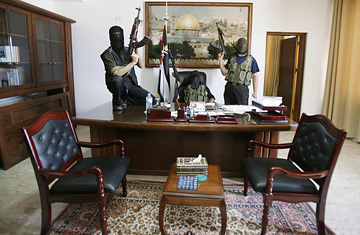
Hamas fighters sit inside the private office of Palestinian President Abbas after capturing it in Gaza June 15, 2007.
After dithering while his Hamas rivals conquered the Gaza strip, Palestinian President Mahmoud Abbas on Thursday took two decisions that underscored his ineffectuality: first, he gave permission for his Fatah fighters to strike back — four days late. By the time Abbas issued the orders, his men were either being paraded through the streets in their underwear, or being executed.
His second decision — to dissolve the Fatah-Hamas coalition government and declare a state of emergency — was already a foregone conclusion. Hamas are the new owners of Gaza strip, with over 1.5 million Palestinians under their Islamist sway, and there is nothing that Abbas can do about it. Gaza is lost to Abbas, who is supported by the Bush Administration and Israel. All the beleaguered Palestinian leader can do now is consolidate his hold on the West Bank territories, where his Fatah forces are stronger than those of Hamas. On Thursday, the Fatah militias rounded up 30 Hamas cadres in the West Bank, and more arrests were expected throughout the night. But these measures are unlikely to ease Hamas' grip on Gaza. In Thursday's fighting in Gaza, over 20 Palestinians were killed, bringing the toll of the four-day civil war to over 90 dead.
Hamas' political intentions are murky. In the morning, one spokesman for the movement trumpeted that "the era of justice and Islamic rule has arrived." But in the afternoon, a more senior official, Abu Zuhri, downplayed the possibility that Hamas would impose an Islamic state in Gaza. "Nothing is going to be changed in the social and cultural life of our people," he vowed. Gaza residents say that neighborhoods under Hamas' control are now safe and orderly.
Israel now faces the sobering fact that Palestinians have split into two dangerous entities: the West Bank under Abbas' chaotic organization and weak leadership, and Gaza under Hamas — an organization pledged to destroy the Jewish state. So far, the Israelis have ruled out any offensive against Gaza's new rulers, but the military has sealed off the 30-mile-long strip's access by air, sea and land. Defense Minister Amir Peretz declared that Israel would not allow the violence in Gaza to spill over into attacks on southern Israel, and the Israelis have plenty of ways to strike back. Not only can they target Hamas installations and leaders with precision air attacks, but they can also turn off Gaza's water and electricity supplies, and halt convoys of humanitarian aid.
Since overrunning all but two remaining Fatah strongholds in Gaza, Hamas has been careful not to provoke the Israelis, and the Islamists are exhibiting early signs of caution towards Israel. Rocket attacks in southern Israel have nearly ceased, and Palestinian sources told Time that Hamas has ordered the criminal gang that kidnapped BBC correspondent Alan Johnston 95 days ago to hand him over, a possible first step towards his release — although this claim could not be verified. Hamas could further calm the atmosphere with Israel by freeing Israeli soldier Gilad Shalit, kidnapped last summer. And on the Israeli side, some pragmatists in the country's intelligence circles have begun giving voice to the unspeakable: that Israel may have no choice but to deal with the new lords of Gaza.
—With reporting by Jamil Hamad
